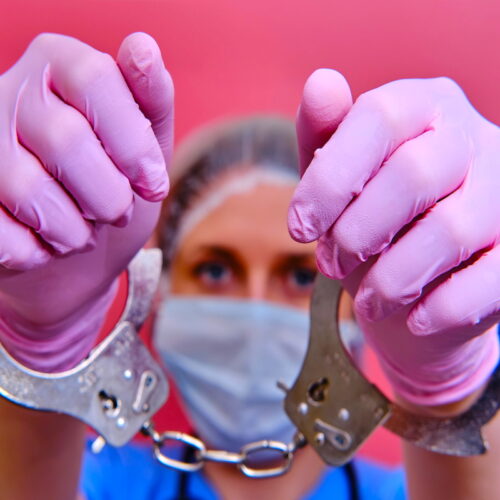THERE IS A SPACE where worlds collide and create the most unexpected of challenges. Sociology like chemistry is a study of interactions and reactions at surfaces. One of those I’ve found most challenging is where the margins of life and margins of liberty meet.
At any random hour of the day and night while working in A&E a stranger in the crowd draws your attention, almost as if Marley’s ghost has found you. A startled pain, in pain and discomfort, hypervigilant, flanked by guards, clothed all in grey, arms weighed by steel chains.
“Hello Sir, will I be in long?”
Not many patients call me Sir these days, that age of deference to authority and gratitude for free health care faded out a while ago. People are busy, especially it seems those who don’t work, often seem the least patient of all. They jostle a Deliveroo pizza, their TikTok account and gossip about their relationships while they have a blood test.
More than once, like a proverbial barber, I have stitched together a drunken woman’s scalp and distracted her by asking, “Going anywhere nice on your holidays?”
It’s not like this with prisoners. They know exactly where they are, that they aren’t going anywhere else soon. Prisoners call me Sir, very much as a habit but still it’s better than “doc” or “mate”. When someone from institutional care needs urgent medical attention strange things happen. Much of this is to do with Denial Of Liberty Safeguarding, or DOLS.
Prisoners by definition are denied liberties but so too are those with significant mental health conditions where this legislation originated. I’ve come to learn people in institutional facilities have a significant loss of autonomy over their health we wouldn’t assume automatically.
Some prisoners do not want to come A&E, they are usually sent here on instruction and initial assessment for me will include if this person even wants to be a patient… occasionally they do not and would rather see a GP later on or even simply refuse treatment as is their right. This has led to some challenging conversations with prison staff who very much follow orders and are not guided by personal autonomy.
Small dignities matter. Once a prisoner using the toilet had the door held open by female prison guards and became angry, he had no say in the matter for security concerns – it was explained to all later that in hospitals mobile screens are employed to allow patients to use the toilet without risking moving them too far. All too often given their backgrounds I have found prisoners to become hostile more through incompetent self-advocacy than malice. That someone struggles to self-advocate should not mean they must not be respected in their attempts.
These people have impaired access to healthcare and many start with a poor level of health and limited education in healthcare. They often do not have a regular GP and if they do they have no means to seeing them… because they’re locked up. All too often care is delayed. One report estimates 40 per cent of outpatient appointments by prisoners are missed… one has to ask who is responsible for an incarcerated man not turning up to a clinic?
I have seen some sad cases over the last few years. Not one but two life threatening neck infections in prisoners, brought after several days delay. It seems sharing a vape with multiple other prisoners is a very bad idea. I have seen a prisoner with a new cancer diagnosis.
An elderly patent with dementia (I’m unsure of the benefit of jailing someone with dementia) had become much worse over a few weeks. He was brought in after not seeing his GP for a while. He rapidly improved after a few sips GlucoGel, which is sugar syrup. His diabetic medication had not been adjusted as he aged and he had been hypoglycaemic for weeks.
The demands on the prison service are legion. It often takes two officers to escort a patient, and when waiting in A&E for hours, two more come to relieve their colleagues. At least four officers at one time are away from prison for a patient seen in A&E for something as apparently minor as a sore throat or a non-specific chest pain. Eight hour A&E waits are common now, often more. That’s an incredible use of resources for delivering what is quite basic care.
Self-harming girls from children’s homes are also another common attender in A&E and often do not need much in the way of physical treatment. There is a serious and growing problem UK wide with deliberate self-harm, a whole article in itself. The irony for so many “on the inside” is that they are in fact on the outside of society and isolated from services we access easily.
In a country where services are failing and taxes are soaring it is a hard sell for anyone on the right to say that by the way we need to care for prisoners and those in care better. I think there’s good reason to though.
People get ill. Bad people get ill. Many bad people who get ill are not in prison. Some are in parliament. Some are in business. The people I see are often from difficult backgrounds where the social skills, the rules of the game, and emotional self-regulation are simply not learned or have multiple compromises.
Sexual exploitation of girls, including by grooming gangs, impacts significantly in deliberate self-harm and presents a major burden on A&E and women alike. To die in prison from not being treated for illness is possibly the most dehumanising experience of any nation, and anything less than dying incurs a cost to the state and society that grows with delay.
For example, a week of steroids and antibiotics costs around £50. A CT of the neck may cost £200 or so. Two weeks in hospital, 3 days in ITU and theatre for a deep neck abscess costs thousands. The wages of four prison guards standing in hospital for 10 hours or in transit and the use of the police van may cost £1000 or more.
We are often told that many A&E visits can be seen by GPs. That’s true assuming anyone can see one quickly. For those experiencing institutional care it becomes more challenging because access is further impaired and multiple people are involved. I think a system where prisoners and wards are seen alongside the general public simply isn’t practical even if it satisfies the need in some to see prisoners benefit from their status. If one has to be in prison to be seen a little faster that isn’t a trade off the vast majority would make.
Advanced access for those in institutional care would close the gap in healthcare access and spare many thousands of hours prison staff spend away from prisons that simply isn’t needed.
There are about 90,000 people in prison, a similar number of children in institutional care with some care places costing over £300,000 a year. That care is borne by us all and cutting the huge indirect cost of providing their healthcare would be a smart move.
What could Advanced Access look like? We could start with admission and booking rights for care providers and wardens to access same day emergency centres (SDEC) in the way GPs can now. Much of the healthcare needed can be done by appointment and priority given to see these people quickly. This is not a treat nor is it treating them better than others, it is a practical step to ensuring huge delays in healthcare don’t affect our prison and care services. A designated GP practice and named GP should be attached to every prison and care facility and regular visits to prisons should be made by primary care to deal early with healthcare issues before they deteriorate. Priority GP slots would again ensure matters that will inevitably be dealt with, are done more efficiently and cheaply.
We should think about a patient first prisoner second approach with any physical restraint being done with a risk assessment and not as a standing order. I have found drunken, demented and psychotic patients far more dangerous and unpredictable than prisoners and doubt much of the restraint used on the latter was truly necessary. Being treated as anyone else should be considered part of the rehabilitation of offenders who in most cases will eventually be back on the inside of society.
This advocacy is important because we live in a democracy where prisoners do not vote. For the record I believe they should not, but that means they are in a place where others must advocate on their behalf. I think doing so is part of the package of living in a freedom loving society that respects long standing Christian traditions on the fair and dignified treatment of those whose freedom has for a while at least been taken away.
Established in 2006, ThinkScotland is not for profit (it makes a loss) and relies on donations to continue publishing our wide range of opinions – you can follow us on X here – like and comment on facebook here and support ThinkScotland by making a donation here.
Photo from Adobe Stock.









